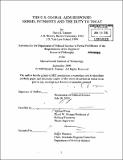The U.S. global AIDS response : norms, interests and the duty to treat
Author(s)
Gartner, David J
DownloadFull printable version (7.982Mb)
Alternative title
United States global AIDS response
Other Contributors
Massachusetts Institute of Technology. Dept. of Political Science.
Advisor
Michael Piore.
Terms of use
Metadata
Show full item recordAbstract
The dissertation seeks to explain the transformation in the response by the United States to the challenge of global AIDS. Between 1998 and 2008, U.S. spending on global AIDS increased 50-fold to over $6 billion. Most conventional explanations of international politics and foreign assistance give a dominant role to various conceptions of interest, including key economic interests and the strategic interest of powerful states. This dissertation tests these dominant theories against a hypothesis that suggests a more significant role for norms and norm entrepreneurs in shaping political decisions. Neither the influence of important economic interests nor the national security interest of the United States can adequately explain the transformation in U.S. global AIDS policy. Instead, an emerging norm around the duty to provide AIDS treatment and the norm entrepreneurs who championed this idea were the driving force in shaping the U.S. response to global AIDS. Emerging norms require effective champions to capture the attention of a wider public and the support of political leaders. Norm entrepreneurs will be most successful when they adopt the strategies of symbolic politics, leverage politics and accountability politics to influence political leaders.
Description
Thesis (Ph. D.)--Massachusetts Institute of Technology, Dept. of Political Science, 2009. Page 150 blank. Cataloged from PDF version of thesis. Includes bibliographical references.
Date issued
2009Department
Massachusetts Institute of Technology. Department of Political SciencePublisher
Massachusetts Institute of Technology
Keywords
Political Science.